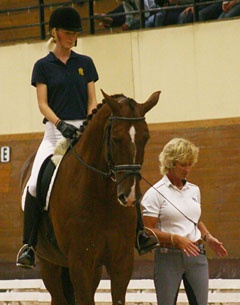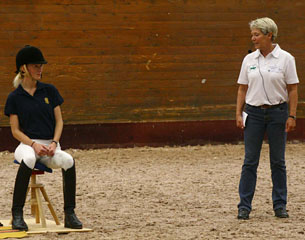
Saddle and seat pressure, rein tension, training rewards and reinforcement, and the evaluation of stress and emotions in riding horses were some of the main topics at the 6th International Society for Equitation Science (ISES) Conference
held July 31–Aug. 2 in Uppsala and Strömsholm, Sweden.
Horse welfare and human safety: the importance of learning, training and education was the main theme. Training and education of horses and riders, from a scientific as well as from a practical perspective, were discussed during the conference hosted by the Faculty of Veterinary Science at the Swedish University of Agricultural Sciences (SLU).
Nearly 200 equine scientists, veterinarians, trainers, teachers and students from 16 European countries and the US, Canada, Australia and New Zealand participated in the conference. The keynote speakers on the first day were Dr Andrew McLean (a leading equine ethologist from Australia), Dr Lars Roepstorff and Dr Marie Rhodin (world class Swedish biomechanics researchers). On the last day, Prof Jan Ladewig gave a background on accidents with horses and humans involved and how these accidents could be prevented not only by using safety equipment but also, for instance, by training the horse to be obedient to the stop signal applied from the reins or the lead rope.
Throughout the rest of the conference the latest research in the field of equitation science (the science of horse riding and horse training) was presented in about 70 oral and poster presentations, highlighting the importance of a thorough understanding of learning theory and physical capacities of the horse to safeguard horse welfare and human safety. The presentations were of a high quality and many fruitful discussions and debates took place during the conference that, without doubt, emphasized the important link between science and practice. The first day focused on the mental and physical capacity for training and learning in both horses and humans. On the second day, the group travelled to the Swedish National Equestrian Centre in Strömsholm where teachers from Strömsholm and the national stud at Flyinge demonstrated their approach to the teaching of young riders and the training of horses. Scientists from SLU showed examples of ongoing research projects, specifically how emerging technologies can measure important variables such as the pressure under saddle and the distribution of lameness.
The last day focused on the latest research in the field of horse welfare and human safety and, in a final panel discussion, the conference explored how these two topics can positively affect each other. The discussion was led by Prof Göran Dalin from Sweden and Associate Prof Paul McGreevy, Australia, and Prof Nathalie Waran from New Zealand participated in the panel together with Susanne von Dietze from Israel, Prof Frank Ödberg from Belgium and Prof Jan Ladewig from Denmark.
 One of the take-home messages from the concluding panel discussion was that new technology can be used to support the practical training of horses and riders to promote the welfare of both horses and riders which will ultimately improve performance. Science can enhance understanding between horse and rider but there is a need to be open minded and humble as we identify the gaps in the complex puzzle of interaction between the two species. It is important that equitation science is included in the education of riders and trainers to improve the welfare of horses. Judges in horse sport need to be involved since what is rewarded in competitions will influence the training of horses and riders. It is already possible to use objective measures for instance of rein tension during dressage competitions to judge the lightness of the horse to support the subjective judging. We should not resist the introduction of any technology that helps to guarantee the welfare of sport horses.
One of the take-home messages from the concluding panel discussion was that new technology can be used to support the practical training of horses and riders to promote the welfare of both horses and riders which will ultimately improve performance. Science can enhance understanding between horse and rider but there is a need to be open minded and humble as we identify the gaps in the complex puzzle of interaction between the two species. It is important that equitation science is included in the education of riders and trainers to improve the welfare of horses. Judges in horse sport need to be involved since what is rewarded in competitions will influence the training of horses and riders. It is already possible to use objective measures for instance of rein tension during dressage competitions to judge the lightness of the horse to support the subjective judging. We should not resist the introduction of any technology that helps to guarantee the welfare of sport horses.
The unification of science and elite sport will form the core theme of the next ISES conference which will be in the Netherlands, 26th-29th October 2011.
The abstracts from the conference will be available soon on the website of ISES www.equitationscience.com.
If you want to have more information, please contact Mari Zetterqvist Blokhuis on mari.zetterqvist@skonet.se.